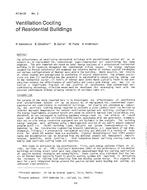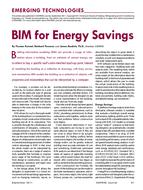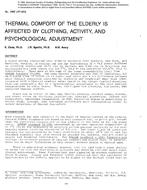A simplified model and input values for slab-on-grade heat transfer is developed and then presented in this paper. The purpose of the underlying research project was to find a more detailed model than the one currently in wide use, but the new model, for comfort applications, was still to be very practical for everyday design use. Several other good, detailed slab-on-grade heat transfer models have been created in recent years, but this new model and factors are easily implemented via hand or computer-based calculations, as well as either for peak load or transient energy predictions. The new model predicts both heat losses and gains and separates the perimeter (“outâ€Â) from the vertical (“downâ€Â) heat flows so that various slab exposures and floor areas can be characterized. Adjustment factors are provided for three different insulation levels, various floor coverings, and distinct soil conductivities. While the current F2·P·?T model, published since 1980 in the ASHRAE Handbook, has input data for only three weather sites, coefficients for 16 locations, ranging from Alaska to Texas, are presented with this new, easy, one-equation model. A comparison of the two methods is included. An example calculation using the new model for the ASHRAE headquarters building in Atlanta is presented, and limitations as well as extensions of the model are discussed.
Citation: ASHRAE Trans. vol. 111, pt. 2, paper no. 4795, p. 122-136
Product Details
- Published:
- 2005
- File Size:
- 1 file , 1.3 MB
- Product Code(s):
- D-27000


